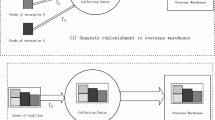Abstract
The booming e-commerce and fierce regional competition pose challenges to Hong Kong’s warehousing industry, which needs transformation to keep its competitiveness. However, neither of the stakeholders (warehouse owner and user) has the motivation to upgrade, due to high facility investment and short terms of rental agreements. Thus it calls for new business paradigms and incentive mechanisms as a driving force. To address this problem, we first propose a new paradigm in which a third party-warehousing equipment supplier is introduced with their advanced facility and technical capability. The three parties can cooperate with different competences to gain more individual payoffs, via the improved warehousing service and operational efficiency. Then a coordination mechanism between the warehouse owner and warehousing equipment supplier is developed to resolve their conflictions on revenue sharing. Accordingly, we develop a stackelberg game to study stakeholders’ optimal strategies, through first establishing a revenue sharing stackelberg-game model and then finding a unique Nash Equilibrium point in analytical format. The properties and constraints about the revenue sharing model are analysed. Comparatively, we also model a centralized decision-making case when the two parties as a whole make decisions to maximize the overall profit. The two models can be used as references to guide the cooperation and competition of companies.



Similar content being viewed by others
References
Ahmadi R, Bagchi U (1990) Scheduling of multi-job customer orders in multi-machine environments. ORSA/TIMS, Philadelphia
Becker C, Scholl A (2006) A survey on problems and methods in generalized assembly line balancing. Eur J Oper Res 168(3):694–715
Cachon GP (2003) Supply chain coordination with contracts. Handb Oper Res Manag Sci 11:227–339
Chaouiya C, Liberopoulos G, Dallery Y (2000) The extended kanban control system for production coordination of assembly manufacturing systems. Iie Trans 32(10):999–1012
Chen J, Huang GQ, Luo H, Wang J (2015) Synchronisation of production scheduling and shipment in an assembly flowshop. Int J Prod Res 53(9):2787–2802
Huang GQ, Chen MZ, Pan J (2015) Robotics in ecommerce logistics. HKIE Trans 22(2):68–77
Lozano S, Moreno P, Adenso-Díaz B, Algaba E (2013) Cooperative game theory approach to allocating benefits of horizontal cooperation. Eur J Oper Res 229(2):444–452
Maltz A (1994) Outsourcing the warehousing function: economic and strategic considerations. Logist Transp Rev 30(3):245
Roodbergen KJ, Vis IF (2009) A survey of literature on automated storage and retrieval systems. Eur J Oper Res 194(2):343–362
Skintzi G, Ioannou G, Prastacos G (2008) “Investigating warehousing policies. Int J Prod Econ 112(2):955–970
Speh TW (2009) Understanding warehouse costs and risks. Ackerman Warehousing Forum
Sridhar S (2017) E-commerce technology made easy. IJITR 5(3):6183–6198
Tao F, Qi Q (2017) New IT driven service-oriented smart manufacturing: framework and characteristics. IEEE Trans Syst Man Cyber Syst. https://ieeexplore.ieee.org/document/7990538/
Tao F, Zhao D, Hu Y, Zhou Z (2009) Resource service composition and its optimal-selection based on particle swarm optimization in manusfacturing grid system. IEEE Trans Industr Inf 4(4):315–327
Tao F, Cheng J, Qi Q, Zhang M, Zhang H, Sui F (2017) Digital twin-driven product design, manufacturing and service with big data. Int J Adv Manuf Technol 4:1–14
van den Berg JP, Zijm WH (1999) Models for warehouse management: Classification and examples. Int J Prod Econ 59(1):519–528
Yang X, Moore P, Pu J-S, Wong C-B (2009) A practical methodology for realizing product service systems for consumer products. Comput Ind Eng 56(1):224–235
Zhang T, Wang Z-z, Chen X, Qu T (2016) Inventory Hedging and Revenue Sharing Under Inventory-Level-Dependent Demand. In: Proceedings of the 22nd International Conference on Industrial Engineering and Engineering Management 2015, Springer
Zou B, Xu X, De Koster R (2016) Modeling parallel movement of lifts and vehicles in tier-captive vehicle-based warehousing systems. Eur J Oper Res 254(1):51–67
Author information
Authors and Affiliations
Contributions
The contribution of this paper is as follows: A new paradigm to push the transformation of Hong Kong’s warehousing industry. A gaming-based coordination method to resolve the profit sharing problem in the New Paradigm. Theoretical solutions and preconditions for the establishment of the New Paradigm.
Corresponding author
Additional information
Publisher’s Note
Springer Nature remains neutral with regard to jurisdictional claims in published maps and institutional affiliations.
Rights and permissions
About this article
Cite this article
Yang, C., Lan, S. & Huang, G.Q. Revenue sharing model in New Hong Kong’s warehousing business paradigm. J Ambient Intell Human Comput 10, 883–892 (2019). https://doi.org/10.1007/s12652-018-0822-3
Received:
Accepted:
Published:
Issue Date:
DOI: https://doi.org/10.1007/s12652-018-0822-3




